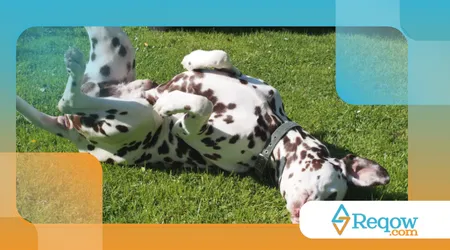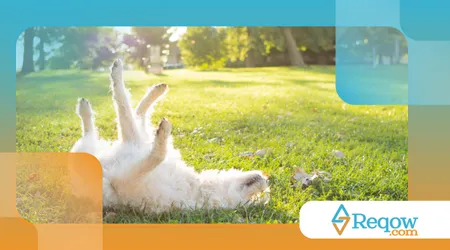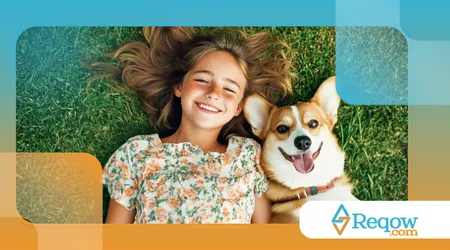Why dogs love to roll in the grass

Why do dogs love to roll in the grass?a. A dog's uncontrollable fascination with lush green grass, culminating in that effusive and often hilarious roll, has intrigued owners for centuries.
Advertisements
This seemingly simple behavior hides deep layers of atavistic instincts and complex sensory needs.
The key to unlocking this mystery lies in understanding the olfactory and social world of our four-legged friends.
Why dogs love to roll in the grass It's a question that takes us to the very essence of their canine nature.
What is the behavioral origin of the rolling habit?
This peculiar habit has its roots firmly planted in wild lineage. Domestic dogs carry the behavioral heritage of their ancestors, the wolves.
Advertisements
These predators used the act of rolling in strong smells, such as carcasses or feces of prey, for olfactory camouflage.
By masking its own scent, the wolf was able to approach its prey more discreetly.
This demonstrates that Why do dogs love to roll in the grass? It goes beyond a simple moment of relaxation.
The smell of perfumed shampoo after a bath, for example, is a warning sign for the dog. He considers it artificial and wants to get rid of it.
Therefore, rolling in the grass becomes an act of olfactory self-restoration, a search for one's original and natural scent.
The dog exchanges the imposed "perfume" for the scent of adventure from the earth and nature.
How does olfactory camouflage influence the modern dog, and why do dogs love to roll in the grass?
Although our dogs don't need to hunt deer to survive, the camouflage instinct remains active.
Natural scents from grass, soil, or even other animals act as an invisible "camouflage jacket" for the dog.
Find out more: Interesting facts about dog breeds that almost disappeared
It's an instinctive way for them to feel connected to their wild past.
The act is an affirmation of one's identity before the world, primarily mediated by the nose.
An example of this is when a dog finds a spot where another animal has urinated; rolling around may be an attempt to absorb or mask that smell.

Why Does Canine Communication Depend on Grass?
Grass is not just a substrate; it's a communication panel. The sense of smell is the primary means of social communication among dogs.
Rolling around is a way of leaving a "fragrant message" for the next canine passersby.
Look how interesting: Interesting Facts About Dogs' Sense of Smell
When a dog rubs itself in the grass, it releases pheromones from its scent glands.
This territorial marking is more subtle than urine, but equally important. It's as if he's posting: "I was here, and this is my unique scent."
| Motivation of Behavior | Description of Canine Intention |
| Olfactory Camouflage | To mask the smell of "clean" or artificiality. |
| Territory Marking | Leaving one's own chemical signature (pheromones). |
| Sensory Pleasure | Absorbs interesting odors; relieves itching. |
| Stress Relief | Emotional "reset"; relief after moments of tension. |
This table summarizes the main reasons that explain Why do dogs love to roll in the grass?.
Is rolling in the grass always instinct, or can it be pleasurable?
Although the root of the behavior is instinctive, pleasure plays an undeniable role.
The texture of the grass, especially if it's fresh or damp, provides a pleasant massage-like sensation on the back. It's a moment of pure physical well-being.
On the other hand, rolling can also be a way to relieve a persistent itch on the back, a hard-to-reach area.
Read more: Importance of annual veterinary check-ups
If this behavior is very intense or repetitive, it may indicate the presence of allergies or parasites.
Approximately 40% of dogs diagnosed with canine atopic dermatitis exhibit signs of generalized or localized pruritus (itching), with rubbing being a common symptom.
What are the indicators of pleasure and stress during sex?
A dog's body language is our most reliable guide. A dog that rolls over in a relaxed way, with its body loose and tail wagging, is generally expressing joy and enjoyment.
On the other hand, if rolling around comes after a stressful event, such as a visit to the vet, it can be a way to release accumulated tension.
Furthermore, rolling in the grass is to a dog what a long stretch is to a human after waking up: an activation of the body and an adjustment of mood.
It's a physical and emotional "reset button." This behavior, therefore, can be a form of emotional self-regulation.
Think about it, the Labrador that, after intense training of agilityHe runs to the grass and rubs himself vigorously, not just scratching, but releasing the pent-up energy of concentration.
Alternatively, the Beagle, after sniffing something intensely, rolls around in the area to "carry" that new scent.

How should pet owners deal with this canine habit, and why do dogs love to roll in the grass?
Rolling in the grass is a natural and, in most cases, harmless behavior. Trying to suppress it excessively can frustrate the animal, as it is an instinctive need.
However, the owner must ensure that the area is safe, free of pesticides or hazardous objects.
We should ask ourselves: why are we so bothered by the smell of "nature" on our pets?
It's important to monitor the animal's rolling to ensure it's not a sign of medical discomfort. If you notice excessive itching or skin lesions, consult a veterinarian.
Understanding the Canine Soul
The act of rolling in the grass is a spectacle of pure joy and biological complexity. It's a direct link between the wild ancestor and the domesticated companion.
Why dogs love to roll in the grassBecause it's instinct, it's communication, it's comfort, and, above all, it's a celebration of their canine identity.
By allowing and understanding this habit, pet owners strengthen their connection with their pets, respecting their innate and fascinating nature.
Frequently Asked Questions
Is rolling around in the grass after a bath a sign of disapproval?
Not necessarily disapproval, but rather a desire to restore their natural olfactory identity. The smell of shampoo is artificial to the dog, and it seeks the familiar scent of nature.
Should I be concerned if my dog rolls excessively in the grass?
If the behavior is very frequent and accompanied by intense itching, redness of the skin, or if the pet rolls in unsanitary places (feces, garbage), it is advisable to consult a veterinarian to rule out allergies, parasites, or behavioral problems.
Could rolling in the grass be a way of getting attention?
Yes, it's possible. If the owner reacts with laughter, shouting, or attempts to stop the dog, it may learn that the behavior attracts human attention, reinforcing the habit.
What does it mean when a dog rolls over with body stiffness?
Rolling over with a rigid body, showing the whites of the eyes ("whale eyes") or a tucked tail can be a sign of stress or an attempt at appeasement, and not just playful behavior.
Context and overall body language are crucial for correct interpretation.
